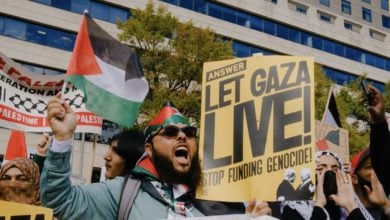Now that major fighting in Israel’s war on the people of Lebanon has passed for the time being, the question has become, who won?
Hezbollah’s political leader, Sayyid Hassan Nasrallah, declared victory for the Lebanese resistance on Monday, Aug.
|
Hezbollah’s justified assessment of the failed U.S.-Israeli aggression caused the imperialist spin machine to kick into high gear. Israel’s deputy prime minister, Shimon Peres, said that Hezbollah finished with their tail between their legs.
President Bush then directly responded to Nasrallah’s speech, claiming that Hezbollah is finished in southern Lebanon and declaring the Lebanon war as part of the “fight against terrorism.” He sounded more defensive than convincing when he said “Hezbollah, of course, has got a fantastic propaganda machine, and they’re claiming victories. But how can you claim victory when, at one time, you were a state within a state, safe within southern Lebanon, and now you’re going to be replaced by a Lebanese army and an international force?”
What’s the truth?
To determine the true outcome, let’s first examine the case set forth by perpetual liars George Bush and his Israeli proxies. Their case for claiming the defeat of Hezbollah is based on the passage of UN Resolution 1701, which among other things, calls for an end to all Hezbollah military operations but only Israeli offensive operations in Lebanon, a phased Israeli withdrawal, an embargo on weapons moving into Lebanon, and puts a force comprised of 15,000 Lebanese army soldiers and 15,000 UN troops in south Lebanon to “keep the peace.” The resolution calls for Hezbollah to be disarmed.
Based on the resolution, the United States and Israel say that Hezbollah’s “state within a state” has been destroyed and that they will no longer exist in southern Lebanon. Nothing could be further from the truth.
Lebanon’s prime minister has already said that the Lebanese army will not disarm Hezbollah. The army has many units composed of Shiite Muslims, many of whom support Hezbollah. Hezbollah supporters would not move to disarm them, and the country’s official military doesn’t have the military capability to do so even if it wanted to. An overwhelming majority of the army, like Lebanese society as a whole, rallied to the side of Hezbollah and the Lebanese resistance in the confrontation with Israel. As noted in the Aug. 15 Los Angeles Times, “Many analysts believe the Lebanese army is more likely to fight shoulder-to-shoulder with Hezbollah than to shut it down.”
Judith Palmer Harik, author of a recent book about Hezbollah, told the LA Times, “This is a victorious group. Do they want to be disarmed at this point? That is such a nonstarter.”
The UN forces are not being deployed not under Chapter 7 of the UN Charter as originally desired, which means they cannot legally act in an offensive manner. It would be foolish at best for UN troops to try to disarm Hezbollah and the other resistance forces. If the resistance can defeat one of the world’s best trained, funded and equipped armies, it wouldn’t have much trouble with a UN force comprised of countries with lesser military capabilities.
It’s worth recalling what happened to French and U.S. “peacekeepers” in the1980s who thought they could easily defeat the Lebanese and Palestinian resistance forces. They had to leave abruptly after major troop losses inflicted by the resistance.
Ibrahim Moussawi, foreign news director at Hezbollah’s Al Manar television station, told the LA Times that no matter
|
Resistance more popular than ever
Hezbollah’s popularity has surged in Lebanon and all over the Arab world because of their heroic stance against Israel and the United States. More than 87 percent of Lebanese supported Hezbollah’s actions against Israel, according to recent polls. They also blew up an Israeli warship, dozens of tanks and helicopters, and inflicted heavy casualties on the Israeli forces. The Lebanese resistance was able to hold major towns in Lebanon’s south like Bint Jbail, keeping Israeli ground forces from penetrating deep into the country, a feat the Israeli commanders thought would be easy.
In his Aug. 14 speech, Nasrallah also proclaimed that Hezbollah’s social network will not go away. He said that Hezbollah will pay restitution to people whose homes were completely destroyed, pay for them to rent for a year and provide new furniture. Hezbollah members also will immediately begin to provide relief and help in rebuilding efforts.
Hezbollah has won this phase of the regional battle against U.S.-Israeli aggression. But overall struggle is far from over. Israeli Prime Minister Ehud Olmert has already said that Israel will continue to pursue Hezbollah’s leaders and will maintain a naval blockade on Lebanese ports. Under international law, a naval blockade is an act of war. This bellicose stance underlines Israel’s desire to push forward their attempts to remake the Middle East in a way suitable to it and Washington.
Standing steadfast in their way remains the Lebanese and Palestinian resistance forces, including Hezbollah. Their unprecedented and historic victory against the Israeli army and U.S. imperialism has given hope to oppressed people in the region and all over the world.








